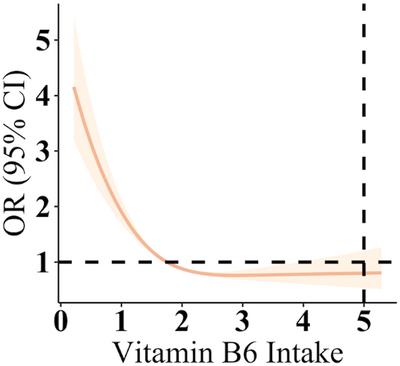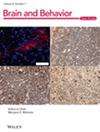Associations of Dietary Intake of Vitamin B6 and Plasma Pyridoxal 5′-Phosphate Level With Depression in US Adults: Findings From NHANES 2005–2010
Abstract
Background
Evidence regarding the associations of pyridoxal 5′-phosphate level in plasma and dietary intake of vitamin B6 with depression risk is scarce. Accordingly, we investigated the aforementioned associations in US adults.
Methods
This is a cross-sectional study that included data from two independent samples of 12,716 and 11,967 individuals (aged ≥ 20 years) participating in the National Health and Nutrition Examination Survey (NHANES) from 2005 to 2010. The associations of the pyridoxal 5′-phosphate level in plasma and dietary intake of vitamin B6 with depression risk were examined through multivariable logistic regression. In addition, we determined dose–response associations by fitting restricted cubic splines to the data.
Results
In the multivariable model, the highest quarter of dietary intake of vitamin B6 was associated with a significantly lower risk of depression compared to the lowest quarter (OR = 0.63, 95% CI: 0.50, 0.79, p < 0.001). Similarly, the highest quartile of plasma PLP levels was linked to a reduced risk of depression compared to the lowest quartile (OR = 0.76, 95% CI: 0.62, 0.93, p < 0.01). With increasing quartiles of dietary intake of vitamin B6 and plasma PLP levels, the risk of depression also decreased accordingly (all p for trend < 0.01). Furthermore, the correlation analysis revealed that for every 1-SD increase in the level of plasma lutein + zeaxanthin and dietary intake of vitamin B6, the risk of depression showed a decreasing trend (all p < 0.01). The interaction test results indicated that the dietary consumption of vitamin B6 did not significantly interact with any of the stratification factors (all p for interaction > 0.05). Moreover, no significant interaction was found between the amount of plasma PLP and any hierarchical factors (all p for interaction > 0.05), except for gender-based subgroup analysis (p for interaction > 0.05). The dose-response relationship results showed a linear decrease trend in the relationship between dietary vitamin B6 intake and plasma pyridoxal 5′-phosphate with the risk of depression.
Conclusions
Plasma PLP levels and dietary vitamin B6 intake in the highest quartiles are associated with a lower risk of depression. These findings support the promotion of a balanced diet rich in vitamin B6. However, future randomized controlled trials are necessary to confirm the effects of vitamin B6 supplementation on depression risk. We should aim for a healthy and balanced diet in terms of nutritional supplementation.


 求助内容:
求助内容: 应助结果提醒方式:
应助结果提醒方式:


